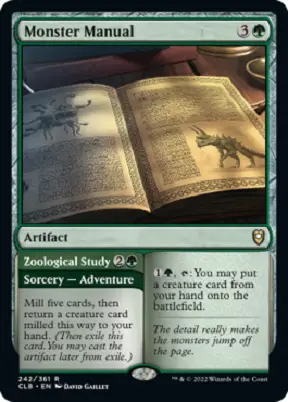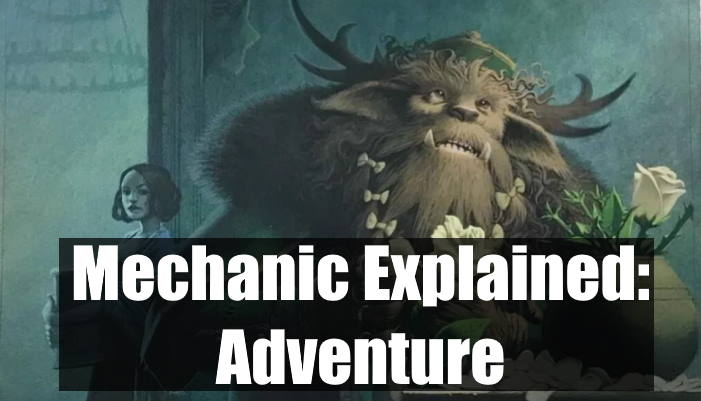Adventure is one of the most popular and innovative mechanics we’ve seen recently. First released in the Throne of Eldraine set, adventure immediately became a big part of several formats. And now, with the upcoming release of Commander Legends: Battle for Baldur’s Gate, the mechanic is finally making a return.
So, to prepare you for the set, I’ll go over everything you need to know about adventure!
The adventure mechanic combines an instant/sorcery spell with a creature or artifact. As you cast the spell, you can choose to cast the adventure half, or the regular creature/artifact half. If you cast the adventure, then the card is exiled after it resolves. You can then cast the regular half of the spell from exile.
If that sounds a bit confusing, don’t worry. Just read on for an in-depth explaination.
What Is Adventure?
Adventure is an alternative spell connected to a creature or artifact spell. The adventure portion of the spell has its own mana-cost and effect.

This concept is similar to split cards like Reduce // Rubble, except one of the spells is a permanent. The most important difference, however, is with adventure, you have a chance to use both spells!
If you cast the adventure half, you exile the card when it resolves. You can then cast the regular half of the card from exile.
RELATED: MTG Background: How It Works and What It Does
How Does It Work?
When an adventure card is in your hand, you can choose to cast the adventure spell or the regular creature/artifact. If you choose to cast the regular card, it enters the battlefield as usual, and you completely ignore the adventure part.
If however, you choose to cast the adventure portion, that’s when things get interesting. Let’s look at Brazen Borrower // Petty Theft as an example.

Brazen Borrower is a 3/1 creature with flash and flying, but that’s not all. He also has an adventure attached to him. Instead of casting Brazen Borrower as a creature, you can pay two mana and cast the attached instant spell, Petty Theft.
This represents sending Brazen Borrower on an “adventure”. You get to return target nonland permanent an opponent controls to its owner’s hand. Then you exile Brazen Borrower // Petty Theft. After that, you can cast Brazen Borrower as a creature from exile.
The flavor here is great. You’re sending Brazen Borrower on an adventure to remove your opponents item. Then, once done with his mission, he’s available for regular service on the battlefield.
FAQs
What Is the Mana-Value of Adventure Cards?
The mana-value of cards with adventure is equal to the casting-cost of the regular permanent spell. The one exception to this is when your casting the adventure half of a spell. For example, casting the Petty Theft half of Brazen Borrower // Petty Theft counts as casting a spell with mana-value two or less. This is only the case when the adventure portion of the spell is on the stack. At all other times, the mana-value is equal to the casting-cost of the regular permanent spell.
RELATED: The Best Baldur’s Gate Spoilers
Rules
- Spells with adventure count as a single card, not two. For an effect that mentions discarding two cards, for example, an adventure card counts as just one.
- If a card with adventure is exiled by effects other than the adventure (ie Path to Exile), you cannot cast it as a permanent spell.
- If an adventure spell is countered, it is not exiled and the permanent can’t be cast.
End Step
Commander Legends: Battle for Baldur’s gate releases June 10th. I can’t wait to go on all the adventures the set has to offer. I hope this article has answered any and all questions you have about this exciting mechanic. If not, drop a comment down below, and I’ll be happy to answer!
